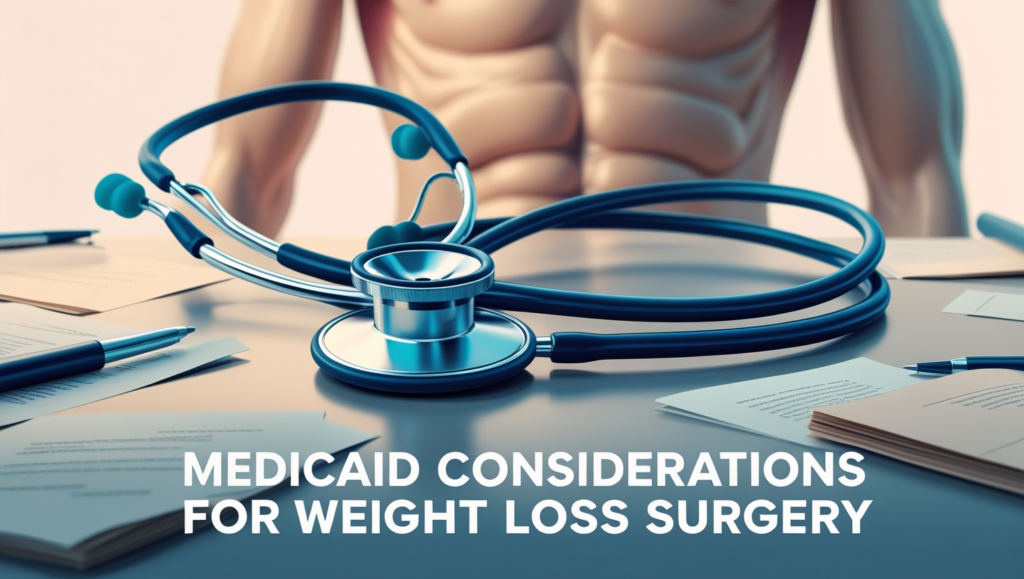When I found out I could get weight loss surgery through Medicaid, I was honestly relieved. It made such a big difference in my journey, knowing I wouldn’t have to pay everything out of pocket.
Does medicaid cover weight loss surgery if you meet specific criteria, such as having a BMI of 40 or higher, or 35 with obesity-related health conditions. Coverage varies by state, so it’s important to check with your local Medicaid office.
Stay tuned with us as we dive deeper into the topic of “Does Medicaid cover weight loss surgery?” We’ll explore the requirements, coverage details, and what you need to know!
Does Medicaid Cover Weight Loss Surgery For All Patients?
Medicaid doesn’t cover weight loss surgery for everyone. To qualify, you must meet specific criteria, such as having a BMI of 40 or higher, or 35 with obesity-related health conditions like diabetes. Medicaid also looks at whether other treatments have been tried before surgery.
Since rules vary by state, some states may have different coverage guidelines. You will need to check with your state’s Medicaid program to see if you qualify. Be prepared to provide medical records and information on previous weight loss attempts. Your healthcare provider can help with this process.
Which Weight Loss Surgeries Are Covered By Medicaid?
Medicaid typically covers surgeries like gastric bypass, sleeve gastrectomy, and adjustable gastric banding (Lap-Band). However, the coverage can vary by state, and some surgeries may not be covered. Medicaid generally covers the surgeries that are proven to be effective in treating obesity.

Your doctor will help determine which surgery is right for you based on your health condition. It’s important to confirm with your Medicaid provider what specific surgeries are covered in your state. Always check with your healthcare provider to ensure your surgery is covered before moving forward.
What Are The Eligibility Requirements For Medicaid Coverage Of Weight Loss Surgery?
These requirements can vary by state, but here are the general guidelines:
Body Mass Index (BMI):
Medicaid typically requires that you have a BMI of 40 or higher. If your BMI is 35 or higher, you may still qualify if you have obesity-related health problems, such as diabetes, high blood pressure, or sleep apnea.
Failed Weight Loss Attempts:
Before getting surgery, Medicaid usually wants to see that you’ve tried other weight loss methods, like dieting and exercising, for a period of time (often at least six months). This is called “medically supervised weight loss.” You’ll need to show proof that these efforts didn’t work.
Age:
While age limits can vary, many states require that you are at least 18 years old to qualify for weight loss surgery. Some states have upper age limits for coverage, but this depends on your specific state’s rules.
Health Conditions:
Medicaid may approve surgery if you have health problems caused by obesity, like heart disease, diabetes, or joint problems. These conditions need to be documented by your healthcare provider.
Medical Evaluation:
A healthcare provider will need to assess whether weight loss surgery is safe for you. You may need to undergo tests or evaluations to confirm that surgery is a suitable option for your health.
State-Specific Guidelines:
Medicaid coverage for weight loss surgery depends on where you live. Each state has its own rules and requirements, so the eligibility may vary based on your location. It’s important to check with your state’s Medicaid office to understand what is needed in your case.
Psychological Evaluation:
Medicaid may require a psychological evaluation to ensure that you are mentally prepared for the lifestyle changes after surgery. This includes understanding the risks and commitment to post-surgery care, such as diet and exercise.
How Can I Check If Medicaid Will Cover My Weight Loss Surgery?
To find out if Medicaid will cover your surgery, start by contacting your state’s Medicaid office. You can ask about their specific criteria for weight loss surgery coverage. Your doctor’s office may also be able to help by verifying your eligibility based on your medical history and BMI.

Make sure to have all the necessary medical documents ready, like health assessments or previous weight loss attempts. If you’re unsure, ask about the appeal process if your surgery isn’t initially approved. Your state Medicaid program may have a website with details on coverage, or you can call directly for clarification.
How Long Do I Need To Be On A Diet Before Medicaid Approves Weight Loss Surgery?
Many states require you to try a medically supervised diet for 6 months before Medicaid will approve weight loss surgery. This is to show that you have made an effort to lose weight through lifestyle changes first. During this period, you may need to keep track of your weight loss and participate in regular check-ups.
Your doctor will provide guidance on the diet plan and ensure it’s medically supervised. Medicaid wants to see that the surgery is necessary after other methods have been tried. It’s essential to follow the guidelines carefully to increase your chances of approval.
What Other Factors Does Medicaid Consider For Weight Loss Surgery Approval?
Here are the key ones:
Health History:
Medicaid will review your overall health and medical history to see if weight loss surgery is the right option. This includes looking at your existing health conditions, like high blood pressure, diabetes, sleep apnea, or joint pain caused by obesity. Having serious health issues tied to your weight can increase the chances of approval.
Previous Weight Loss Efforts:
Before approving surgery, Medicaid often requires you to try other weight loss methods, like dieting and exercise, for a certain amount of time—usually six months. The goal is to show that you have made a genuine effort to lose weight through lifestyle changes but were unsuccessful. You’ll need documentation from your healthcare provider showing that these efforts were medically supervised and failed to produce lasting results.

Mental Health Readiness:
Medicaid may want to ensure that you are mentally prepared for the changes that come with weight loss surgery. This includes understanding the lifestyle changes required after the surgery, such as sticking to a strict diet, exercising, and attending follow-up appointments. Some states may ask for a psychological evaluation to confirm you’re ready for the challenges ahead.
Age and General Health:
Your age and overall health can influence Medicaid’s decision. In some cases, there might be age limits—usually between 18 and 65 years old. They’ll also look at whether your general health is stable enough to handle the surgery and recovery. For instance, if you have a serious medical condition that could complicate surgery, Medicaid may be less likely to approve it.
Failure of Other Medical Treatments:
Medicaid may want to see that you’ve tried other less invasive medical treatments, such as prescription weight-loss medications or participation in a weight loss program. If you’ve tried different approaches and none of them worked, surgery might be considered the next best option.
Support and Commitment to Follow-up Care:
Medicaid will likely want to know that you are committed to following the necessary steps after the surgery. This includes attending follow-up appointments, adhering to a special diet, taking vitamins, and making long-term lifestyle changes. They want to ensure that you understand the importance of these changes for the surgery to be successful.
Medical Documentation and Evidence:
To approve weight loss surgery, Medicaid will require detailed medical documentation. This can include test results, reports from your doctor, and a history of your weight loss attempts. It’s important that your doctor provides thorough information about why surgery is needed for your health.
How Can I Appeal If Medicaid Denies Coverage For Weight Loss Surgery?
If Medicaid denies your weight loss surgery, you can appeal the decision. First, ask for a detailed explanation of why the surgery was denied. Your doctor can help by providing additional medical documentation or clarifying your eligibility. Follow the appeal instructions provided by your state’s Medicaid office.
You may be asked to submit more information or attend a hearing. Keep track of all deadlines during the appeal process. If your appeal is denied, you can consult with a legal professional who specializes in healthcare to explore further options.
FAQS:
What weight loss surgery does Medicaid pay for?
Medicaid typically covers surgeries like gastric bypass, sleeve gastrectomy, and Lap-Band. Coverage may vary by state, so it’s important to check with your local Medicaid office.
Do weight loss doctors take Medicaid?
Many weight loss doctors do accept Medicaid, but it depends on your state and the doctor’s practice. It’s a good idea to call ahead and confirm if they accept Medicaid.
Does Medicaid cover weight loss surgery for minors?
Medicaid usually doesn’t cover weight loss surgery for children under 18, except in special cases. Each state has different rules, so check with your local office.
Do I need a referral to get weight loss surgery through Medicaid?
Yes, most states require a referral from your primary care doctor or a specialist to start the process for weight loss surgery. Ask your doctor to guide you through the steps.
How long does it take to get approved for weight loss surgery through Medicaid?
The approval process can take several months, as Medicaid needs to review your medical records and weight loss history. Be prepared for multiple steps and possible delays.
Is weight loss surgery covered by Medicaid for people with other health issues?
Yes, Medicaid may approve weight loss surgery for people with health problems like diabetes or heart disease related to obesity. Make sure your doctor provides the necessary documentation.
Conclusion
whether or not Medicaid covers weight loss surgery depends on several factors, including your health conditions, BMI, and past weight loss efforts. It’s essential to meet the specific eligibility requirements and understand that coverage can vary by state. If you’re considering weight loss surgery, be sure to check with your local Medicaid office for detailed information and to ensure you meet all the necessary criteria.












Discussion about this post